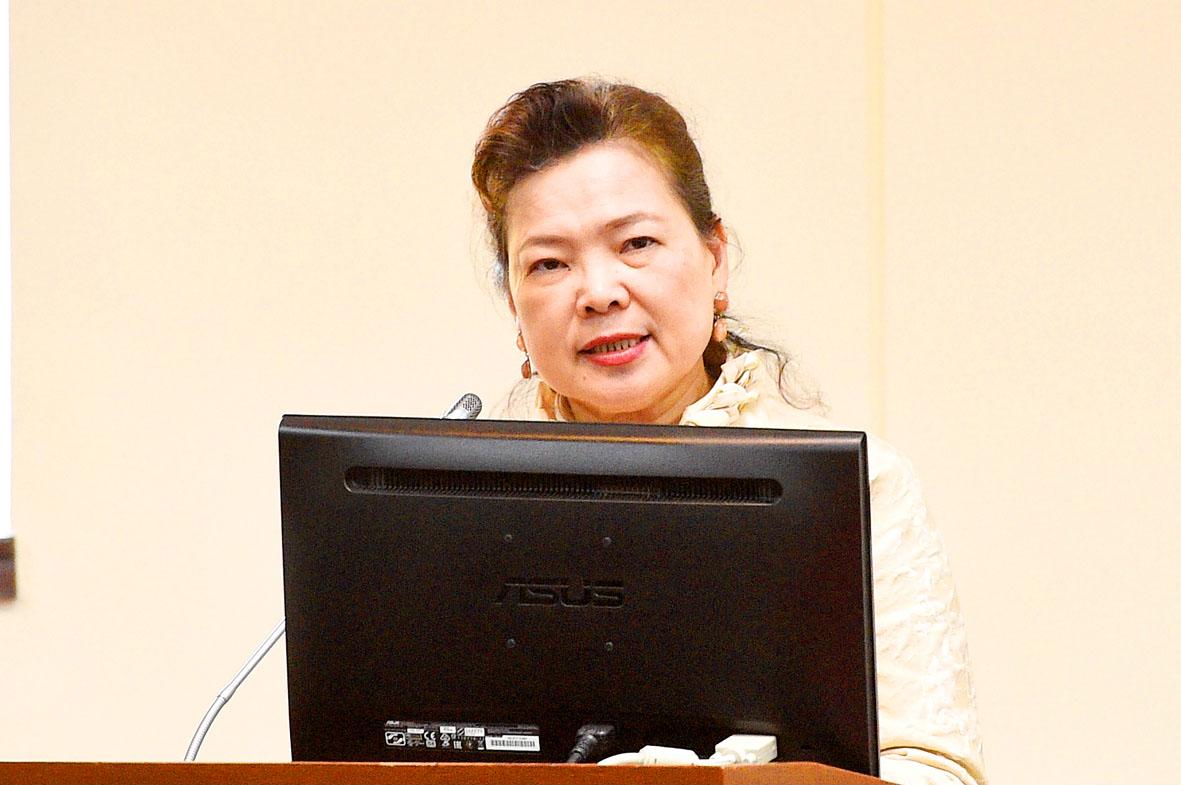CPC Corp, Taiwan’s (CPC, 台灣中油) sale of a 35 percent interest in its Chad oil field to a Chinese company sparked harsh questioning of Minister of Economic Affairs Wang Mei-hua (王美花) in the Legislative Yuan on Monday.
The arrival early this month of the first barrels of oil from the Oryx Oilfield in Chad was celebrated in Taiwan, but lawmakers soon became alarmed when they learned that CPC in 2016 sold half of its 70 percent stake to China CEFC Energy Co (華信能源).
Last week, the ministry submitted a classified report on the share sale, but Chinese Nationalist Party (KMT) Legislator Yang Chiung-ying (楊瓊瓔) said it did not address core concerns about who authorized the sale of such a large stake to a Chinese company.

Photo: George Tsorng, Taipei Times
“Shouldn’t the ministry form a committee to get to the bottom of this issue?” Yang asked.
CPC president Lee Shun-chin (李順欽) had told the legislature’s Economics Committee that the initial plan was to only sell 28 percent of its stake, but the Chinese firm insisted on 35 percent and no other companies at the time would agree to CPC’s terms.
At the time, Paul Chen (陳綠蔚) was CPC president and Lin Sheng-chung (林聖忠) was chairman, but both have since retired.
An internal ministry department has been investigating the matter, Wang said, promising to submit a report to lawmakers by Jan. 17.
The Oryx Oilfield is CPC’s first successful attempt to independently prospect and develop an oil field overseas.
The sale was a necessary risk-management strategy, CPC had previously said, adding that it had signed contracts assuring its continual control of the site, despite the Chinese company owning an equal stake.

CHIP WAR: Tariffs on Taiwanese chips would prompt companies to move their factories, but not necessarily to the US, unleashing a ‘global cross-sector tariff war’ US President Donald Trump would “shoot himself in the foot” if he follows through on his recent pledge to impose higher tariffs on Taiwanese and other foreign semiconductors entering the US, analysts said. Trump’s plans to raise tariffs on chips manufactured in Taiwan to as high as 100 percent would backfire, macroeconomist Henry Wu (吳嘉隆) said. He would “shoot himself in the foot,” Wu said on Saturday, as such economic measures would lead Taiwanese chip suppliers to pass on additional costs to their US clients and consumers, and ultimately cause another wave of inflation. Trump has claimed that Taiwan took up to

A start-up in Mexico is trying to help get a handle on one coastal city’s plastic waste problem by converting it into gasoline, diesel and other fuels. With less than 10 percent of the world’s plastics being recycled, Petgas’ idea is that rather than letting discarded plastic become waste, it can become productive again as fuel. Petgas developed a machine in the port city of Boca del Rio that uses pyrolysis, a thermodynamic process that heats plastics in the absence of oxygen, breaking it down to produce gasoline, diesel, kerosene, paraffin and coke. Petgas chief technology officer Carlos Parraguirre Diaz said that in

Japan intends to closely monitor the impact on its currency of US President Donald Trump’s new tariffs and is worried about the international fallout from the trade imposts, Japanese Minister of Finance Katsunobu Kato said. “We need to carefully see how the exchange rate and other factors will be affected and what form US monetary policy will take in the future,” Kato said yesterday in an interview with Fuji Television. Japan is very concerned about how the tariffs might impact the global economy, he added. Kato spoke as nations and firms brace for potential repercussions after Trump unleashed the first salvo of

SUPPORT: The government said it would help firms deal with supply disruptions, after Trump signed orders imposing tariffs of 25 percent on imports from Canada and Mexico The government pledged to help companies with operations in Mexico, such as iPhone assembler Hon Hai Precision Industry Co (鴻海精密), also known as Foxconn Technology Group (富士康科技集團), shift production lines and investment if needed to deal with higher US tariffs. The Ministry of Economic Affairs yesterday announced measures to help local firms cope with the US tariff increases on Canada, Mexico, China and other potential areas. The ministry said that it would establish an investment and trade service center in the US to help Taiwanese firms assess the investment environment in different US states, plan supply chain relocation strategies and